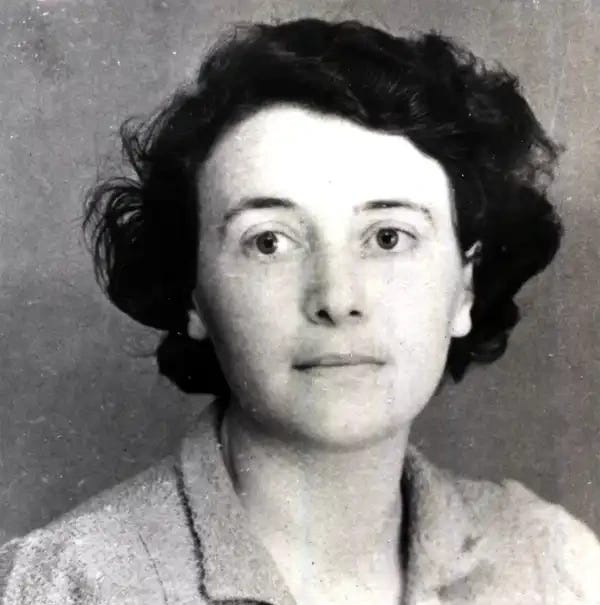The downside of having a ‘legacy’ is that it deprives you the privilege of having any secrets.
Take Eileen Blair, the wife of Eric Blair (a.k.a. George Orwell). I’m reading a book about her right now: Eileen: The Making of George Orwell, by Sylvia Topp, and I’m really enjoying it. Eileen was a fascinating character—an intelligent woman who was content to work behind the scenes, contributing towards her husband’s legacy instead of creating her own. Reading about her has given me a new perspective on George Orwell—something I don’t think he would have ever wanted.
Orwell was a private man. He wrote under a pseudonym, and largely kept his private life out of his writing. His writing was political, but in his private life, he elected to live in the countryside, in living conditions which were far more humble than his “shabby-genteel” upbringing would have allowed. This was all by choice, to be clear—he and Eileen never had to truly fear for their economic well-being. Still, when reading Orwell’s writing, despite his references to going outside to milk his goats and tending his garden and whatnot, one would not get the sense that this is what was important to him.
It brings up what I find to be an extremely compelling question. What acquaints you with a person more thoroughly: reading everything they’ve ever written, or knowing them in person? I’ve always kind of leaned towards the former, but by reading this book, I realize that I’ve been completely wrong. There can be aspects of one’s life that are completely absent from writing, either because the writer is too ashamed to write about them or just simply doesn’t find them important or interesting enough.
The sometimes intimate writer-reader relationship is, in fact, entirely limited in scope. Should we keep it that way?
George Orwell was adamant throughout his life that he never wanted a biography of his life to be written. It was only in 1980 that his second wife, Sonia Orwell, authorized Bernard Crick’s George Orwell: A Life to be written. She made this decision in response to the publication of an unauthorized biography: The Unknown Orwell, Peter Stansky and William Abrahams. Although this is entirely conjecture, I imagine her reasoning was that if people could not be stopped from writing biographies, it was best to have a say in what went in them.
Things have only gotten more relaxed since then. With Sonia gone (who often acted as a ‘gatekeeper’ to Orwell’s legacy), essentially anything goes. If the existence of The Unknown Orwell has proven anything, it is that people are morbidly curious about the lives of the people whose work they enjoy.
Now we have Topp’s Eileen, which reveals some of Orwell’s story through the lens first wife, who he quite puzzlingly made little mention of in his writing. There are numerous other biographies, too. Some, like Rebecca Solnit’s Orwell’s Roses, detail aspects of Orwell’s life that were absent from his published writings. There are also memoirs like Jacintha Buddicom’s Eric & Us: a detailed account of Buddicom’s childhood friendship with Orwell which she alleges ended in sexual assault. I do not wish to ‘gloss over’ this topic, but I have also not yet read the book or looked into the event enough to comment, so at this point, I am just leaving this here.
My point in bringing this up is that Eric & Us was published in 1974, twenty years after Orwell’s death and six years before Sonia authorized a biography of his life to be written. There is clearly no controlling your legacy.
Is readers’ desire to learn about the personal life of literary figures a sick type of voyeurism? I undertook this project out of a deep respect for George Orwell’s work—it’s kind of messed up to think that it has ended up in what he may have perceived as a gross invasion of privacy.
The fact that we’re even able to get such an in-depth profile of writers is a fairly new phenomenon. Famous writers who lived just a century before Orwell died a complete mystery. It’s only now, in our ‘information age,’ that secrets have vanished.
Do we have a right to privacy after we’re dead? Would it be better if biographers just stopped, took the work for what it is, and left the personal lives of writers alone? Is it fair that, when studying a writer’s work, their darkest secrets are listed alongside their greatest accomplishments?
Thank you for reading. If you enjoyed this post and would like to support my work, consider becoming a free or paid subscriber.
You can also buy me a coffee.





Yes
I think as long as you establish yourself as a public figure, you have to consider your life will possibly be shared with everyone. You lose your privacy when you chose that route.
As long as their are famous people there will be curious fans and writers….. and some are grifters just to piggyback on your hard work. It is an invasion of privacy. I’ve experienced that myself a little.